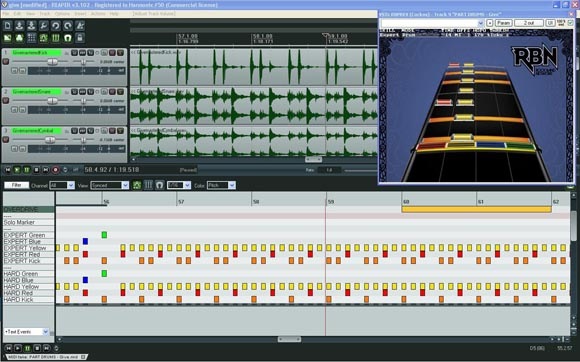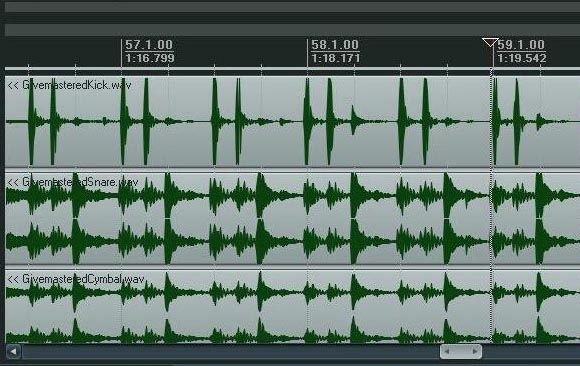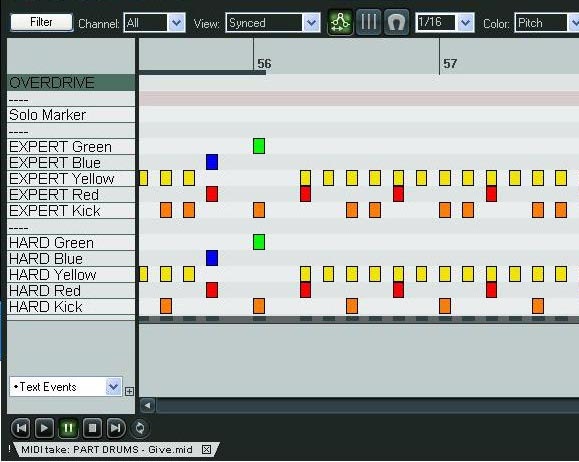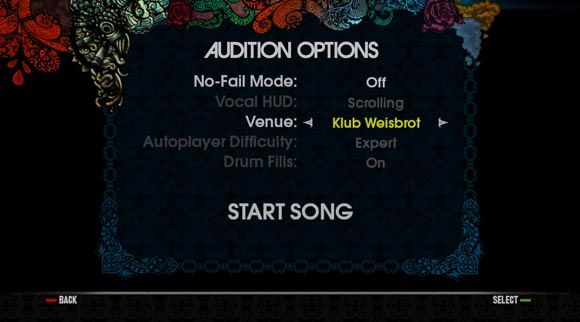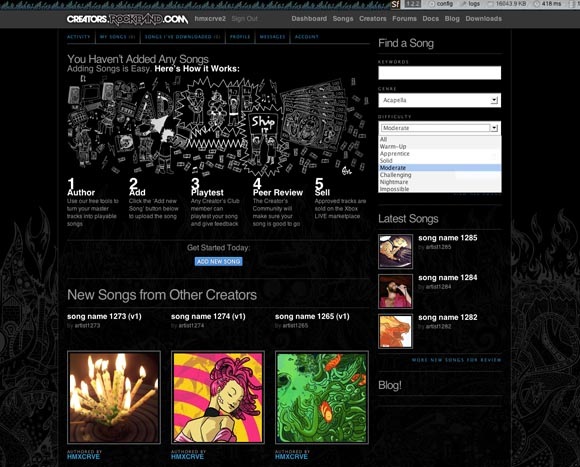There’s a lot of hype around the latest schemes for changing how artists get their music to fans, but not actually a whole lot of news. (It always seems to boil down to a website with some unpronounceable name.)
Well, this is news: Harmonix is opening up Rock Band to anyone who wants their music in it, and giving you the same sophistication of tools they use themselves. That’s a real game-changer – literally.
And I don’t mean just for the actual game Rock Band. Sure, Harmonix was the house that made music games a phenomenon in the US. They learned well from Japan’s Masaya Matsuura, perfected music games’ mechanics in Amplitude and Frequency, popularized the formula by launching Guitar Hero, then rocked collaboration with Rock Band before convincing the infamously-guarded Beatles to finally embrace digital tech. But the sad reality of game music in general is that it’s been a playing field for the old guard – it’s licensing deals with major labels to promote music you’ve already heard. It’s the top hits on the radio, redigested onto your game console. There’s commercial calculation behind even the tune that’s in the background while you’re paging through a screen in Madden. Harmonix has already changed some of the economics, and disrupted even what could be a hit, as kids discover classic metal for the first time or geeks grab music by Jonathan Coulton and Stephen Colbert. But that’s not quite the disruptive shift in game music so many people have expected.
I think Rock Band Network could be the first real sign of that shift.

Rock Band Network promises to be something really different. How?
- Anyone can get their music in the game. You don’t even need a label. You need a few (cheap) software tools, a computer, and some basic MIDI chops, and for a fraction of the cost of pressing a couple hundred CDs, any artist can get their work into Rock Band 2.
- It’s a real community-driven process. Your A&R people don’t have to shmooze with MTV. You don’t have to enter into some complex developer agreement with Microsoft or Sony. There isn’t even a shady, mysterious review process like the Apple iTunes App Store. Actual Rock Band fans will get to play your music and tell you that the animation needs fixing and the difficulty level needs to be fixed on the drums.
- You use Reaper – an actual music production tool for grown-ups. Harmonix could have given us some weird in-game tool they cobbled together themselves. Instead, they give us a special verison of Reaper, the brilliant, full-blown Digital Audio Workstation that inexplicably costs just US$60 but blows the pants off a lot of better-known tools. So you actually get to assemble your music the way Harmonix has been doing for years, with a real tool. Fortunately, the process has been made much easier and copiously documented, but it’s nice to be treated like adults for a change.
- If it works, Rock Band is just the beginning. It’s impossible to see into the future. RBN is a leap of faith both in the artists and the game fans, in terms of their taste and the amount of effort they’ll invest. But if it works, Rock Band Network could change the way people think about interactive user-created content, well beyond just furniture in the Sims or Little Big Planet.
Anyway, enough of the big picture – let’s talk details. I got to sit down with the Rock Band Network team from Harmonix high above Times Square in MTV’s offices this week to get a full-blown demo – including some seriously fun nerding out with composer/sound designer Caleb Epps, plus Senior Producer Matthew Nordhaus and MTV’s games man, Paul DeGooyer. (In a sign that the big media world still doesn’t quite get what’s going on in this field, no one at the Viacom security desk had even heard of Harmonix.)
The team was extremely generous with technical details of Rock Band Network, and walked me through the process of how artists would get going with RBN. Here’s a first look at that process.
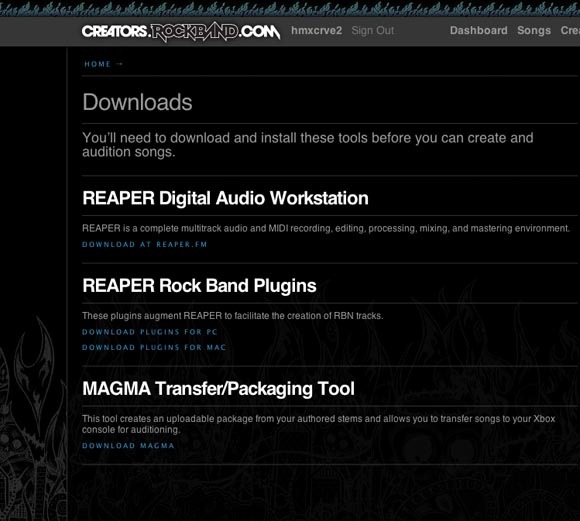
What You Need to Get Started
$60 Reaper + free plug-ins + a computer + Windows to beam over the music + an Xbox 360 to test on.
1. Reaper (Mac, Windows) For the authoring itself, you may be surprised: you don’t need some special tool. You use Cockos’ brilliant, lightweight, Reaper. It’s not even Reaper Rock Band Edition. Reaper for Mac will work, too. Cost: US$60 for the standard license, or US$225 if you’re already a huge rockstar.
2. Reaper plug-ins (Mac, Windows) Reaper plug-ins: this download is the real magic, adding everything from shortcuts for making tempo maps to color-coding tracks to helping you add lyrics, animations, and everything else that makes your song into a Rock Band track… game. Gamesong? Songgame? Cost: Free.
3. MAGMA Packaging Tool (Windows) MAGMA is a simple tool that facilitates getting those files packaged up with artwork and keywords and such, and moving them over to the Xbox 360 for testing yourself and for sharing with the rest of the community. It is Windows-only because it relies on Microsoft’s networking functionality with the console, but Harmonix says they’ve had no problem using it on the Mac via an emulator or Boot Camp. Cost: Free. (or the cost of Windows if you’re on the Mac).
4. Xbox Creators’ Club Membership: Join Microsoft’s game development community, and you get access to a special Rock Band creators area that lets you upload and share your tracks – and other tracks from other users (which is where item #5 comes in). Cost: $99 /year (Note that there are some discounted ways to get at this for shorter terms, and you get all the game developing features of the community, too, in case you want to try to make your own game in XNA.)
5. An Xbox 360 and Rock Band 2: You do want to actually play the results, right? (Unfortunately, because of the reliance on Creators Club, Sony’s PS3 isn’t yet supported, though some sort of PS3 distribution is planned for the future.) Cost: About to come down thanks to sales – and now you get to write off an Xbox 360 on your taxes.
Total cost: as little as $100-160 or so with the various pieces, or a little more if you need to pick up an Xbox 360 and the game and/or equip your Mac to run Windows.
By the way, Ars Technica claimed this month, based on the experience of one developer, that Xbox Live [is] not ready for user-generated content. That claim is simply wrong. Sure, LittleBigPlanet is cool on PS3, but the infrastructure for moderating content is there, on the community created for the XNA game development platform. And the tracks for Trails HD (the game mentioned in that article) or even LittleBigPlanet really pale in comparison to what Harmonix is about to unleash. It’s the first time a game has really been a platform, which was long the vision of Harmonix’s founders.
Now, let’s get into actually making your music.
The Tempo Map
Since Rock Band is assuming …well, a rock band, you’ll need to allign a tempo map with the audio so the software knows where the bars are. Caleb Epps showed me some of the nifty shortcuts that make moving from bar to bar snappy and automagical. Reaper itself has actually incorporated feature enhancements to accommodate the Rock Band workflow – which, in turn, means that the wider Reaper community may find improvements that impact them outside of preparing tracks for the game. I’ll cover this process in more detail once Harmonix unveils the wider beta.
MIDI Mapping and Animation
Here’s where the real work begins. When I visited Harmonix in Cambridge as they were developing the first Rock Band game, I found one guy hunched over a copy of Cubase doing just this: adding MIDI events for the game play at different skill levels. Now, in Reaper, you’re doing a process that’s just as sophisticated – it’s just much more user-friendly and quicker. (Harmonix says they’re gradually adopting the tools for the Rock Band Network internally, and some of their work already uses it.)
Especially nice: you’ll see color coding that matches the different game controllers.
MIDI isn’t just used for the notes in gameplay, though. You also add notes for the vocals, with the “+” key signifying a syllable extending across notes and another character designating notes that can’t be sung. (Bob Dylan, I’m looking at you.)
Most interestingly, you can tightly control animations, down to when the onscreen drummer chokes a hat or the camera cuts to the singer or the lighting in the venue activates, all using MIDI events. Check out the “Text Events” dropdown in the screen grab above.
If this sounds like a lot of work, it is. Fortunately, Harmonix says that the finished release will include tools that, say, allow the software to intelligently generate the animations. You can come back and tweak those if you wish, but you won’t necessarily have to manually add every single camera move – even though that’s traditionally how Harmonix does it.
All of this gets saved as standard MIDI files, so theoretically DAWs other than Reaper could perform the task, too – though for now, I can’t imagine wanting to leave Reaper, given the level of integration and documentation. But it’s nice that Harmonix hasn’t invented some crazy closed format, because if this takes off, I could see people creating other tools.
The Simulation
Now, if you had worked at Harmonix up until recently – as I saw when I did that first office tour – you’d then have to figure out how to get this song over to an Xbox console to play test it. Happily, you don’t have to do that any more. A convenient plug-in will pop up a graphical representation of any of the four parts. You can watch them animate through and get a real sense of what it’s like playing the game.
This is implemented as a standard plug-in, but the UI requires Reaper to work properly, so for now, it’s restricted to Reaper.
MAGMA and Play Testing
Good game design is all about play testing. So, when you’re distributing your music as a game, it’s essential that you actually play it as a game.
Yep, that’s right. This is the stage of the process where you have to play your Xbox. (Shame.)
MAGMA is the tool that packages in artwork and beams the track over to your Xbox 360 console. Provided your computer and your console are on the same network, the process of getting a built track to the Xbox is nearly instantaeous.
You can “audition games” locally, thanks to a patch to Rock Band 2 allows anyone with a Creators Club membership to play the games. That means you can easily test your own tracks on your Xbox, but also explore what other people are doing. And the community will ultimately determine which tracks are good enough to be approved.
In other words, if you don’t want to make your own Rock Band tracks, but want to become a virtual Xbox music “scout,” you could sign up for a membership and look for the next big thing by playing their music – interactively – on Rock Band.
That’s got to be better than dealing with all the CDs that usually show up in your mailbox.
The best part of all of this to me is that people can offer feedback. You can get through the first pass of your music, but then see how it’s playing with other people. Need to fix a camera angle? Dial down the difficulty on one level? Now you’ll get real feedback.
Interestingly, this also complements Microsoft’s other purpose for the Creators’ Club, which is to encourage independent game development using their elegantly-designed XNA game tools, some of which ultimately make it to Xbox Live Arcade. I think there’s actually a chance this could breathe some life (and users) into that service. Now, if only Microsoft would build more robust audio tools into the game toolkit so some crazy indie developer can built the next Frequency or Amplitude …but I digress.
Q&A
Anticipating the kind of questions you may be asking yourself…
When does it all happen? The network is now in closed beta. A larger beta is planned for next month, with a full launch expected around October.
So who will use all of this? I think there will be several groups:
1. Indie bands with tech savvy.
2. Indie bands who aren’t tech savvy, who will learn Reaper to get this working – and wind up using Reaper and other computer audio tools to produce their next album. (Harmonix promises extensive documentation to give them a hand. I’m sure CDM can help, too.)
3. Electronic artists who build a cottage business around prepping other people’s tracks.
4. Game developers and game fans who pick this stuff up because they love Rock Band, and wind up getting further into music.
And while 1-3 are certainly interesting to CDM, I hope we get to interract with people in that fourth category.
Isn’t this going to be too hard for some people?
Yup. Yup, it is. On the other hand, Harmonix is going to great lengths to make this easier – and if you are a skilled MIDI sequencer, you’ve just found a business opportunity.
I’ve got a Mac and a PS3.
Don’t sweat it. A lot of the Harmonix folks are Mac users, alongside the happy Windows users. It could be well worth running in an emulator or a second partition, and you can still do all your music production on the Mac. As for the PS3 – well, you can either make friends with an Xbox owner, or watch for the sale I hope is coming. You do need a hard drive, but otherwise this seems a reasonable investment.
Will I get paid?
We’ll talk more about this in a future story, but yes – thanks to the Xbox Creators Club payment infrastructure, you can expect to get paid early and often (payments arrive quarterly), meaning this could be a decent revenue stream at a time when they’re hard to find.
Performance licensing is apparently not applicable to Rock Band (I did ask about that); that’s, again, a topic for a separate article.
What if my instrumentation doesn’t fit Rock Band?
Check out the Rock Band catalog. There’s some flexibility here, as long as the game play works. You just need to make it work for the default setup so that people with a mic, a guitar, a bass, and a drum kit in front of their TV can have a good time.
And as I talked to Harmonix, we talked about the fact that previously unavailable genres could look really fantastic in the game – yes, Norwegian Death Metal, your time has come! (Now, if we just got vocal harmonies as in The Beatles…)
I also expect some really, really odd submissions in the community. (“The World’s Hardest Rock Band Track,” anyone?)
Meanwhile, I’m hoping that Harmonix will re-release their back catalog, Frequency and Amplitude, on Xbox Live Arcade, and then doubly hoping they’ll let people author for them, for all of us fans of electronic music with unusual instrumentations, and the unusual gameplay mechanic of those games. (Their new PSP game, incidentally, quietly returns to that game style.)’
On the other hand, I don’t expect Harmonix to do everything here. If this works, Rock Band could be just the beginning.
Changing the World of Music
Harmonix has long talked about wanting to create a “platform” for music, but I think it’s really Rock Band Network that could get them there. Rock Band alone can’t be the exclusive future of interactive music – that’d be boring. But if Harmonix pulls this off, it could be a real catalyst for transforming all recordings into an interactive experience – not just the established hit parade we’ve already seen. And that’s utterly huge.
I also think it’ll be well worth the time of CDM to watch as this evolves. We talk a lot about alternative controllers, about interaction design, about the merging spheres of games and music, but also about musical integrity and creativity and new outlets for spreading musical material. Rock Band Network could bring all of those ideas into mainstream consciousness in new ways.
And, oh yeah – it’ll be a heck of a lot of fun to play those tracks, and to get people playing your music. Stay tuned.
Sign up for the beta and get more information here:
